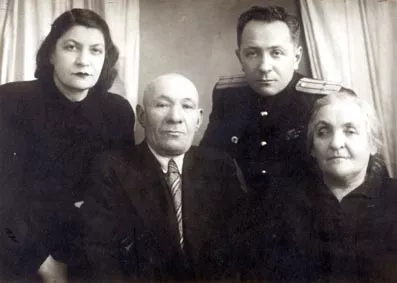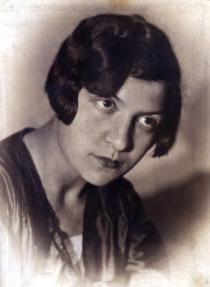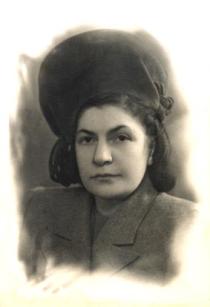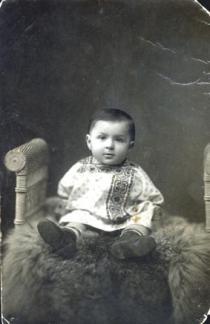This photograph was taken in 1952 in Leningrad. Here you can see my mother, my father, my brother and me. Mom got ill in 1952 and died in 1953.
My Daddy's name was Solomon Yakovlevich Sorkin. My Mom's name was Roza Samuilovna Sorkina, nee Rubina.
Daddy worked also in timber sphere (like my maternal grandfather) before his arrival to Leningrad, and Mom was a housewife (women did not work at that time).
Peno railway station where we lived is known as a place where Liza Tchaikina was executed by fascists. [Tchaikina Elizabeth (1918-1941) was a member of partisan group during the Great Patriotic War; a Hero of the Soviet Union (posthumously).] At that time we had to spend an hour to get from Peno to Ostashkov, and we had to get to Petersburg by a long-distance train (it came once a day). And now it takes two or three hours to get from Ostashkov to Petersburg by electric train.
My brother and I were at home, we did not attend kindergartens. Mom took care of us. When we lived in Peno, a teacher came to teach us at home. Later we together with my brother lived at our grandmother and grandfather in Ostashkov, and Mom and Daddy remained in Peno.
Daddy was religious. But he taught his children neither Yiddish, nor religious Tradition.
At home we observed kashrut: meat was cooked separately from dairy, etc. But when we lived at Peno railway station, there was no synagogue. It was necessary to go to Ostashkov by a long-distance train, and then hire a cab to get to the synagogue from the station. So we went there not very often, you understand. And when we lived in Peno, we were the only Jewish family there: it was almost impossible to observe Tradition. At that time there were no manifestations of anti-Semitism around us.
We arrived in Leningrad in 1930. After our arrival we stopped observing kashrut.
In Leningrad I found job (at that time I was sixteen years old). Mom and Daddy attended synagogue, but Mom seldom visited it. As for me, I went to the synagogue during holidays - it was very interesting to be present at the synagogue during holidays [the St. Petersburg Great Choral Synagogue was closed under the communists, nevertheless at holidays a lot of people gathered there despite the prohibition of authorities].
In Leningrad Daddy was not able to find job according to his profession, therefore he worked at vegetable stores as a storekeeper. Those vegetable stores were usually situated in cellars.
During the war we remained in the besieged Leningrad. Years of blockade (1941, 1942) passed away.
And my brother graduated from the Moscow Air Force Academy. He was sent to Kazan [the capital of Tatarstan], so at that time he lived in Kazan.
We reached Kazan, and Daddy got ill right after our arrival. He suffered from diarrhea. I went around Kazan on foot to find my brother. I managed. By that time he had already processed necessary papers for our evacuation by airplane (you see, my brother was a military representative at a large factory!). So we remained in Kazan.
I returned to Leningrad in 1946. I found work at the factory of aircraft instruments. I worked there as an engineer. At that time the factory was called Techpribor [one of the oldest enterprises of aircraft instruments founded in 1942]. During some period of time the factory had got no name, but different numbers: 936, later 448, etc. Unfortunately I have already forgotten the other numbers of it.
In Leningrad our room appeared to be occupied. So we had to rent a room and had legal proceedings for the room. We managed to evict our property from its unlawful possessor. And we lived here all together: Mom, Daddy and I.
After Mom's death in 1953 we remained together with Daddy. He worked for some time, but later he had to stop working because of high blood pressure. He kept the house (cooked, cleaned) and I worked.
Daddy died in 1966.













